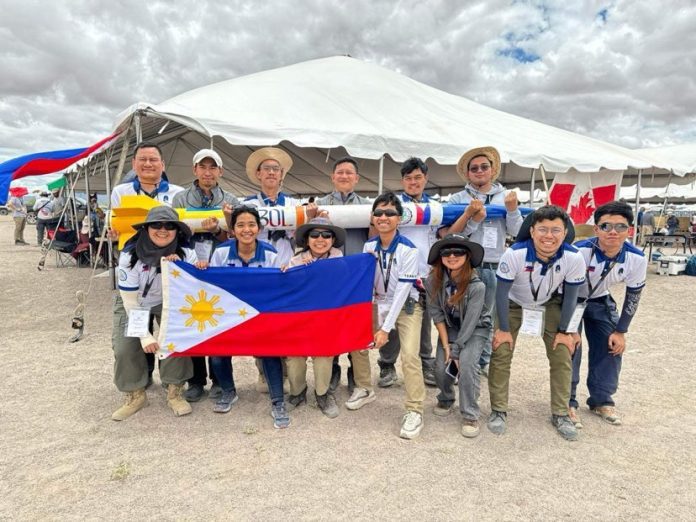New Mexico, USA — Cheers erupted as a PHL rocket launched successfully from the Spaceport USA grounds today.
The first and sole PHL rocket this year, it was ready yesterday, 21 June 2024, but weather was a major consideration.
“Strong winds yesterday and rains and clouds today” were not at all ideal flight conditions, Engr. Ramon Gregorio III, PHL team faculty technical adviser said.
The PHL team rocket lifted off when rains stopped. Called Sibol (Filipino for growth), the 9.7-foot rocket surged 10,000 feet up as required and arced, heading back to earth with its payload of 8.8 pounds.
Spaceport USA directors called it “a great achievement” for a first-timer team.
“It was a clean and powerful launch from an M2100 motor,” Rodion M. Herrera said. Herrera is a rocket enthusiast and a former college faculty member at the Ateneo de Davao University (ADDU).
The PHL rocket was created in Davao City, specifically at ADDU. ADDU is the only university in Mindanao that offers Bachelor of Science in Aerospace Engineering (ASE). It is also the only Philippine school that sent a team to the tilt, which had 200 teams from 20 countries.
“The launch is a victory for Filipinos who aim for excellence and innovation in space technology,” student lead Franz Guevara declared.
“The PHL rocket, which competed in the commercial off-the-shelf (COTS) 10,000-feet category, was recovered safely from the field,” Dr. Rogel Mari D. Sese recounted. Sese is the Chair of the ADDU ASE Department and Lead Advisor of the ADDU Rocketry Team .
“The ASE student and faculty team had been working on it for a year to qualify for the competition,” Sese said. They hurdled the rigorous Flight Readiness Review early on, which earned them a spot in the tilt.
Spaceport America Cup is a design-build-fly competition as well as an academic conference for aerospace students, faculty members, and industry stalwarts, among others. It is based in Las Cruces, New Mexico.
The video of Sibol’s successful launch was a highlight of the University President’s Address today at the ADDU College Commencement Exercises of some 1,300 graduates at the University’s Jacinto Campus in Davao City.
“This is ADDU’s humble contribution to the development of space technology, which is crucial in our pursuit of sustainable development goals,” Rev. Fr. Karel S. San Juan, SJ said.
“We will continue developing better rockets and other space technologies that can contribute not only to academic research but also to the betterment of society and humanity,” Sese added.
The PHL team extends its gratitude to Philippine Airlines, the City Government of Davao, and US-based Filipino organizations for the unstinting support for this pioneering team.
“This historic competition is just the beginning for ADDU, Mindanao, and the Philippines. I would like to invite more partners to work with us on this mission,” San Juan said.

